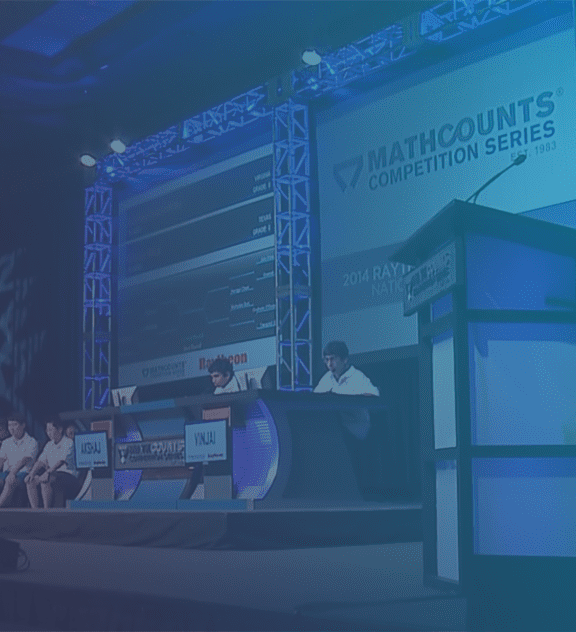
AN INTERVIEW WITH TYLER ERB
MATHCOUNTS Monthly, March 2022
Tyler Erb, a longtime coach at Community House Middle School in Charlotte, NC, is currently serving as the 2021-2022 DoD STEM Ambassador for MATHCOUNTS with a focus on the Competition Series. In this role, Tyler is working on creating practice competitions to help Mathletes prepare for the Competition Series, as well as multiple MATHCOUNTS Practice Plans.
Tyler has done extensive work in his school (and larger community) to promote equal access for all students to advanced math. So, we interviewed Tyler about how he encourages a diverse group of kids, particularly those who are traditionally underrepresented in STEM, to participate in advanced math both in and outside of the classroom, including in MATHCOUNTS programs. Read the full interview below (edited for clarity).

On getting kids to try advanced math for the first time...
You’ve done a lot of work in your school and in your community to get more kids involved in advanced math, particularly students who are underrepresented in STEM. What strategies have you found to be most effective in getting kids to try out more challenging/advanced math for the first time?
When I started math club for the first time, I had two strategies. One was creating something that was low-stakes and more of a fun exploratory environment to get students interested in the non-standard based math that is needed for competition math. It's scary for kids to get a 10/30, so throwing a practice competition at them right at the start isn't helpful. The second was the "bring a friend" policy: if you are interested in math club or just doing advanced math in general, bring a friend along with you. You are going to have a much better time when you have someone there that you like to hang out with. When you get frustrated about a topic or know that you are struggling, you have a friend to have your back right from the get-go. Once students feel like they have a safe environment to learn difficult concepts and know their questions will be heard and answered, they can focus on just learning the advanced math. As the club evolved, I made sure to have student helpers from the high school that would help give more representation. I saw that we had a lack of girls in our advanced classes and made sure to have past female students help out and encourage girls to continue to come and to continue to pursue advanced math. After that, we saw a decent spike in participation from girls. Representation matters.
On getting kids to persevere when the math gets tough...
For those students who tend to get discouraged easily or shy away from tough math problems, what strategies have you found to be most effective in motivating those students to persevere and stick with advanced math?
Testimonials from past students on their own growth can really motivate students. When a 6th grader sees an 8th grader that they value as an authority in math explain that they were once in that exact same place, it helps students see progression is possible. Having some of my 8th grade MATHCOUNTS students share out that they didn't make the MATHCOUNTS team in 6th grade but stuck with the program and continued to come and learn—and are now on the team going to states—helps let the students know that it's possible. Just because this isn't your year or your moment doesn't mean it can't be later on. Giving students a model of what their productive struggle can become gives them a visual of what success can be. I also like to show them how their data improves over time. Looking at past scores on competition or practice rounds of competitions lets the students see how they are growing even if they don't see it now. Seeing real numbers, being able to say, "You were only able to solve half of these problems, and now you're solving 7 or 8 out of 10," can be helpful. The same goes with advanced math. With learning new topics all the time, students can get bogged down when they don't feel like they have conquered a topic. Showing them their growth, and where it can lead, is a great motivator.
On how to get started...
For someone who is just starting out in MATHCOUNTS programs, what advice would you offer on how to recruit a diverse group of students, including students who are traditionally underrepresented in STEM, to participate?
Again, that "bring a friend" policy is huge. Also, don't be afraid to go to the teachers in your school and specifically ask them to encourage those underrepresented students. Having your math teacher come to you and say "Hey I believe in you and think this might be something you're good at" means a lot to a student, especially in middle school. Once that student comes to your club, know who they are and tell them "Mr./Mrs. So and so told me this is something you need to try and I'm excited that you're here, and I can't wait to work with you." Try and build up their confidence as much as possible from the beginning. Seeing advanced math for the first time can be very humbling so we need to be their biggest cheerleader. Start out with low-stakes problems and use the Problem of the Week and handbook Warm-Ups to pique their interest. Once you have them hooked with the easier problems, you can start giving them harder and harder material.
On differentiating for Mathletes...
Many Competition Series teams have a mix of Mathletes in grades 6, 7 and 8, and students often come to MATHCOUNTS at vastly different levels of preparedness for competitions. How do you differentiate for your Mathletes?
Using your past students can be huge! You can tag-team with them to teach a concept while you work with the other group. Using kids as teachers and leaders is important. It shows kids that that could be them in the future. Another strategy is giving my older students tiered practice on a topic and then teaching the basics to the younger students. That way, if an older student forgets a topic, they can hop right in while I teach, but if they feel like they have mastered it, they can just work on the practice with their peers to sharpen their skills. Josh Frost's books of practice competitions (Volume 1 and Volume 2) are great to have on hand in situations like this as well. Also, the one fortunate thing about the pandemic was that a lot of my MATHCOUNTS lessons got recorded. When I know we are going over a particularly difficult topic in a certain week, I will link to videos of the basics of concepts or of me teaching in advance so that they can understand parts of the topic ahead of time. For example, if we are going to deal with more complex number base problems, I will refer them to a past MATHCOUNTS Mini lesson or past stretches from the School Handbook. The pairing really helps because it gives them a video explaining general concepts or a more difficult problem that applies the concept and then practice that they can grasp.
On connecting with other adults to support in advanced math endeavors...
You’ve done a lot of work outside of your school and classroom promoting advanced math, out in the community and other schools. How did you connect with other adults to support you in this work and continue it with their own students?
Working with your feeder schools' math teachers and parents can be huge. Ask your students who their favorite math teacher or teacher in general was and the most vocal students will help you find other teachers willing to help or spread the word or advocate for the program. Staying in constant communication with your feeder elementary schools is important, to keep them up to date on when we are holding information sessions for example, but this way it's not an elementary school load. Word of mouth is crucial to starting up any math program because your own students will start recruiting their friends and siblings to join the club and their parents will help let other families know. I knew especially starting out, I would need the support of my elementary schools to help build up students so that they were coming in ready to do advanced math and competition math.
On advice for new coaches...
What do you know now about MATHCOUNTS coaching that you wish you had known in your first year?
First, you aren't going to know a lot of this math, and that's totally okay. Even if you are a math person like I feel like I am, so much of this math is number theory, geometry, and algebra concepts that you do not have to normally do in your college math classes when you're learning to be a teacher. Just because you haven’t been taught that, though, doesn’t mean you can’t pick it up – it’s just going to take some time. Be okay with not knowing things and looking at MATHCOUNTS Minis or even Googling a problem or concept to figure it out. Be okay also with learning from your kids. They will probably always know more than you. Even though at the beginning, you're terrified and it feels really hard, they should be better at this than you. You may not feel confident for a while, but it's so worth the payoff whenever you finally get there.
Second, I didn't know MATHCOUNTS Minis existed, and that was rough. MATHCOUNTS Minis, the newly formed practice plans, and just MATHCOUNTS books in general are huge! Use these resources to help teach yourself and your students. It will take time but once you have been exposed to the math, you really start to get the hang of it. Your goal is that your students should be smarter than you when it comes to MATHCOUNTS and other competitions. You open the door for them to run through, and it's expected that they get better at it than you do.